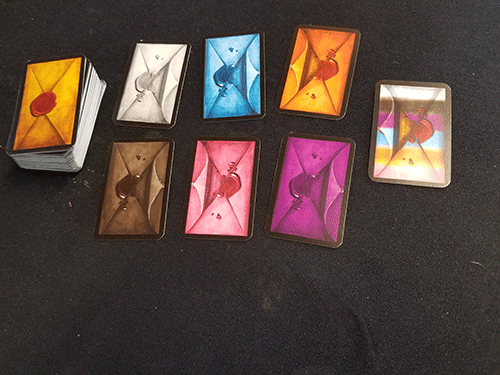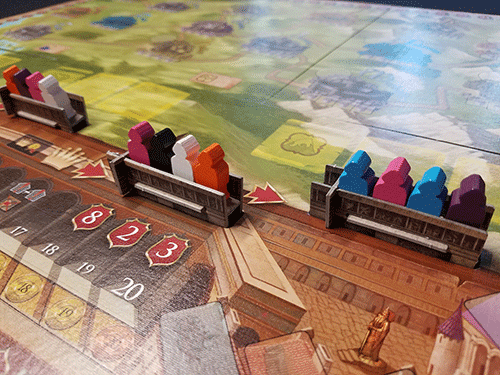Council of Four Review
on Sep 14, 2016
Thematically, I’m not exactly sure what’s going on with Council of Four. You seem to be building storehouses in various cities – though it isn’t clear to what purpose. And when we change the council members, we get money. So … is that a kind of strange, reverse bribery? But put aside the thematic question marks and you have a solid euro title that really delivers a fun and interesting experience. With callbacks to classics like Thurn and Taxis, this updated title should satisfy most euro lovers.
The board shows 15 cities, but the board is also broken into three pieces. Each piece is double sided and can be played on either side. The result is that you get eight different map configurations with roads and city colors slightly changed on either side. The game has a track for coins instead of using chits – which works well in this context. And it also has little 3D councils that stick out of the board. The council members come in six different colors and there is a deck of Politics cards in matching colors.

Poltical flavors - Vanilla, Blueberry, Orange, Chocolate, Strawberry, Grape and Super Neapolitan.
On a turn, a player can add one member to a council (and thereby knock an existing member off), A player can also acquire a building permit by interacting with (bribing?) the relevant council. A building permit lets you build on one of the cities and also has a bonus ability. That bonus might get you more cards, some coins, or even a second action in the same turn. On a later turn, you can use an action to build an emporium in that city and gets its bonus – along with every bonus in a connected city where you have an existing emporium. Finally, you can use the King’s council to build where the king is even if you don’t have a permit. I suppose the King can cut through the red tape.
There are also bonus tiles for building in all the cities in a section of the board or all the cities of a color. And those bonus tiles even come with extra “King’s Favor†bonus tiles for the first players to do so. There is a strong tension between building connected cities and going for the bonuses. Connected cities can give you special benefits over and over. And since assistants and nobility can be hard to achieve otherwise, being able to reliably get bonuses is a great way to ensure you continue to have income.
But the points for completing objectives can be huge. In fact, the first player to complete any of them gets a bonus of 25 points. That’s the biggest one-time bonus in the game! Of course, if you rush to do so, you’ll inevitably end up breaking your chain of cities and will get fewer bonuses when you build. The players have to determine from game to game what the proper mix and balance is. And since the city bonuses are always randomly distributed, it’s a slightly different challenge each time.
But there is one major drawback in Council of Four. One of the bonuses is a paltry five points for building in the two blue cities. It seems reasonable until you factor in the King’s bonus. Because it only requires two build actions, the blue bonus is easy to get and often the first to go. Which means it gets the 25 point king’s bonus. So for two builds, you can nab 30 points.
This particular exploit carries the potential to upset the careful tension in the rest of the game. After all, even if the two cities are widely separated, it means that, at most, your chain is only missing one city (because you simply build out from the other) and is delayed by a single build. That’s an impressive haul of points for very little opportunity cost.
Still, it isn’t a game breaking issue. And the advantage of the move can be more or less depending on the configuration of the board and the placement of the city bonuses. Nevertheless, it is powerful enough that it needs to be on everyone’s mind. I would always expect one or more players to try and grab that bonus early. Not only is it worth a ton of points, but by taking the top King’s Favor, you leave only the second highest favor for the next guy – thereby decreasing the available points to others.

Nope, not trains.
But, as long as the players are aware of that tactic, it isn’t unbeatable. A strong and repeated chain can beat even that initial influx of points. But it’s a little disappointing that this otherwise exceptional title has one outsized issue that players must compensate for during the game.

 Customer Support
Customer Support  Subscribe
Subscribe 




 Account
Account  Wishlist
Wishlist 
